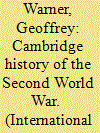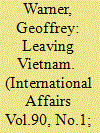|
|
|
Sort Order |
|
|
|
Items / Page
|
|
|
|
|
|
|
| Srl | Item |
| 1 |
ID:
102955


|
|
|
|
|
| Publication |
2011.
|
| Summary/Abstract |
1950 was a crisis year in the Cold War and saw a growing rift between the United Kingdom and the United States over how best to wage it. It was in the Far East that the most dangerous crisis occurred. Britain recognised the People's Republic of China, not only because the Communist regime clearly controlled the mainland, but also because it was felt that it was not irretrievably linked to the Soviet Union. The United States, on the other hand, regarded China as a Soviet satellite and displayed a consistently hostile attitude towards it. The situation worsened with the outbreak of the Korean War in June. Although the United States and Britain agreed that the invasion of South Korea must be repelled, the British were anxious not to broaden the conflict, whilst the Americans used it as a stick to beat the Chinese. The war also prompted accelerated rearmament and the Americans favoured the rearmament of West Germany. Things came to a head in November, with the large-scale Chinese intervention in Korea, followed in early December by a visit to Washington by the British Prime Minister, Clement Attlee. The British believed that the United States had already concluded that a global war was inevitable, whereas they wished to avoid it if possible. As this article shows, the events of 1950 amply demonstrated the subordinate position of Britain in the "special relationship."
|
|
|
|
|
|
|
|
|
|
|
|
|
|
|
|
| 2 |
ID:
148463


|
|
|
|
|
| Summary/Abstract |
Following on from earlier three-volume histories of the Cold War and the First World War, Cambridge University Press completes a trilogy with this detailed treatment of the Second World War. Multi-authored in the Cambridge tradition, the individual chapters cover a wide range of events and topics and the 81 contributors, mainly but not exclusively from the United Kingdom and the United States, include both scholars who have already established a reputation in the subject as well as those who are in the process of doing so. Perhaps the greatest strength of the volumes is the treatment given to what may be loosely referred to as the Pacific War. No one who uses them properly is going to have any doubts about the nature and importance of the struggle between Japan and its opponents between 1937 and 1945, and it is particularly encouraging to note the use of Chinese and Japanese sources by the authors, when so many English-language books on the subject cite none. The principal weakness of the enterprise is its division into an unnecessarily complicated series of topics, which is not always adhered to by the authors and which often compels the unfortunate reader to skip backwards and forwards, not only within but between volumes. Despite this flaw, however, this remains an important contribution to the history of the Second World War and will need to be consulted by any serious student of the subject for many years to come.
|
|
|
|
|
|
|
|
|
|
|
|
|
|
|
|
| 3 |
ID:
102668


|
|
|
|
|
| Publication |
2011.
|
| Summary/Abstract |
The Cambridge history of the Cold War is a three-volume work by 75 contributors, mostly from the United States and the United Kingdom, and is intended as 'a substantial work of reference' on the subject. The bulk of the text deals, in frequently overlapping chapters, with the main protagonists of the conflict-viz. the United States, the Soviet Union and the People's Republic of China-and the areas in which they clashed. At the same time, it aims to go 'far beyond the narrow boundaries of diplomatic affairs', although it is not always successful in doing so. In analysing the origins of the Cold War, the contributors pay perhaps too much attention to ideology as opposed to geopolitics, a flaw which is made easier by the absence of sufficient historical background. On the other hand, the duration of the conflict and the failure of various attempts at détente is more successfully explained in terms of the zero-sum game nature of the conflict and its progressive extension from Europe across the rest of the world. When it comes to the end of the Cold War, the overall conclusion is that this came about through both a shift in the international balance of power following the Sino-Soviet split and the political and economic problems of the Soviet bloc. It is generally agreed that Mikhail Gorbachev's willingness to abandon old shibboleths both at home and abroad was a major factor in bringing about the end of the conflict. The three volumes, while not always an easy read, are the outcome of considerable research and expertise in both primary and secondary sources and will repay careful study.
|
|
|
|
|
|
|
|
|
|
|
|
|
|
|
|
| 4 |
ID:
131422


|
|
|
|
|
| Publication |
2014.
|
| Summary/Abstract |
Although anticipated, the North Vietnamese 'Easter offensive' against South Vietnam in 1972 created problems for the United States. Having reached a rapprochement with Communist China, President Nixon and his foreign policy adviser, Henry Kissinger, believed that the attack could have serious repercussions for their attempt to balance it with détente with the Soviet Union, not to mention the US's credibility as a Great Power. They also feared it would damage Nixon's prospects for re-election in November 1972. Despite opposition from his Defense Secretary, Nixon renewed the bombing of North Vietnam which had been stopped by President Johnson in 1968. This helped to bring the North Vietnamese back to the conference table and after complex negotiations, a draft peace agreement was ready for initialling in October 1972. However, President Thieu of South Vietnam saw significant drawbacks in the agreement and refused to go along with it. The North Vietnamese chose to have one more attempt to win on the battlefield and President Nixon, who had scaled down the bombing when peace seemed closer and won a landslide victory in the presidential election, launched another eleven days of concentrated bombing raids on North Vietnam at the turn of the year. This led to the final agreement initialled on 23 January 1973, which President Thieu reluctantly acceded to. Thieu's reservations were justified, but Nixon realized that, despite his electoral victory, he could not count on the continued support of Congress and the American people for the war. Far from bringing 'peace with honor in Vietnam and Southeast Asia', the January agreement was a fig leaf to cover American withdrawal.
|
|
|
|
|
|
|
|
|
|
|
|
|
|
|
|
| 5 |
ID:
066027


|
|
|
|
|
|
|
|